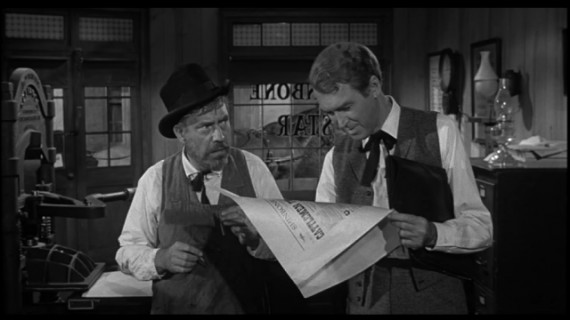Newspapers Print the Legend
Journalists have been following Maxwell Scott's advice since long before "The Man Who Shot Liberty Valance" was made.
In a famous scene at the end of the 1962 classic “The Man Who Shot Liberty Valance,” editor Maxwell Scott explains why he’s not going to use a story that would destroy the myth upon which a politician’s career was built: ”This is the West, sir. When the legend becomes fact, print the legend.” A new book reveals just how true that exchange was.
Many of the landmark moments in American journalism are carefully nurtured myths—or, worse, outright fabrications.
William Randolph Hearst never said, “You furnish the pictures, and I’ll furnish the war.” Orson Welles’s “War of the Worlds” radio broadcast didn’t panic America. Ed Murrow’s “See It Now” TV show didn’t destroy Sen. Joseph McCarthy. JFK didn’t talk the New York Times into spiking its scoop on the Bay of Pigs invasion. Far from being the first hero of the Iraq War, captured Army Pvt. Jessica Lynch was caught sobbing “Oh, God help us” and never fired a shot.
These fables and more are lovingly undressed in W. Joseph Campbell’s persuasive and entertaining “Getting It Wrong.” With old-school academic detachment, Mr. Campbell, a communications professor at American University, shows how the fog of war, the warp of ideology and muffled skepticism can transmute base journalism into golden legend.
Mr. Campbell’s examples run from the Spanish- American War to Hurricane Katrina, with oddities like the feminist bra-burning at the Democratic Convention in 1964 sandwiched in between. In each case, the author teases out the grain of sand around which the pearl of the myth was spun.
Some of the myths were created after the fact by publicists and hagiographers, cemented in our minds through movies and other pop culture reinforcements. But some were directly attributable to journalistic decisions.
Welles also figures in the fable that his 1938 Martian-invasion radio show convulsed the nation. As Mr. Campbell tells it, newspapers spawned the myth by splashing scare headlines over thin stories. Radio was becoming a real competitor for news coverage, and the papers had a vested interest in smearing the new medium as irresponsible and sensationalist.
[…]
Mr. Campbell pins two of his myths directly on the Washington Post. The Jessica Lynch fable had its inception, he says, in a Post story based on intelligence sources who misinterpreted Iraqi battlefield reports. They somehow mistook Lynch for the real hero of the engagement, Sgt. Donald Walters, a cook in her unit who lost his life while single-handedly holding off Iraqi ambushers. The Post, Mr. Campbell says, was also a leading culprit in promoting the 1990s myth—based on the flimsiest of scientific evidence—that the infants of crack-smoking mothers were doomed to lives crippled by mental and physical problems.
The Post’s immortal Bob Woodward and Carl Bernstein also come under Mr. Campbell’s critical gaze. He argues that the myth of “the heroic journalist,” inspired by their Watergate-era reporting, obscures the reality that it took “special prosecutors, federal judges, both houses of Congress, and the Supreme Court, as well as the Justice Department and the FBI” to force Richard Nixon out. Journalism, in this reading, kept the scandal alive while the authorities did the real investigation and exposure of Nixon’s crimes.
Part of this is naked self interest and ego. Most of it is reporters who are clueless about the subjects they cover, and thus predisposed to believe anything that makes for good copy.







This is all very true Jim but the issue it seems to me is whether it’s getting worse and I fear it is. My benchmark isn’t the 1900’s when I know the media made up a lot of stuff but fifties and sixties when I grew up. I’ve no doubt these decades are littered with examples of press hype but overall the media had a lot more credibility because they deserved it. There weren’t the shoutfests on TV, if people made silly claims interviewers rolled their eyes metaphorically if not actually, when the great pundits spoke people read them avidly. Can you think of one of our great pundits today who people read “avidly.” The media noise level has now become so high I think people are just tuning them out.
Today’s media are more segmented, so people making silly claims can go to sympathetic venues. But I’d argue today’s journalists are radically more adversarial than their pre-Watergate predecessors.
We mostly consume our content through audio-visual media rather than reading these days. But Jon Stewart, Stephen Colbert, Sean Hannity, Rush Limbaugh, Bill O’Reilly, and others have very avid audiences.
Additionally, we’re much more fragmented now, since everyone can read or hear any pundit out there. Back in the day, you had your three networks and your local paper. Apples and oranges.
Again, people have more choices now. In an era of competition, television news has become infotainment. They were tuning out news for, say, ESPN and syndicated reruns well before the shout era. Indeed, I’d argue that the shoutfests are a direct response to that: A means of attracting audience attention that would otherwise go elsewhere.
” But Jon Stewart, Stephen Colbert, Sean Hannity, Rush Limbaugh, Bill O’Reilly, and others have very avid audiences.”
Walter Lippman they aint. They may have avid minority audiences but when Lippman or even someone like Joe Alsop said something the whole country paid attention (not to mention the president) and that’s without Uncle Walter. Jon Stewart and Colbert are comedians, well so are others really.
I take issue with Mr. Campbell’s assessment that the myth of the “heroic journalist” is indeed a myth. In the case of Woodward & Bernstein, yes, they were not solely responsible for bringing down a president, but they played an important role. You have to ask yourself if events would have unfolded exactly the same way they did if they had no involvement and wrote not a single word about the Watergate break-in. When it comes to Congress, the FBI, special prosecutors, etc., I think we all know that there has to be a political will to pursue certain cases. I’m sure that was especially true when it came to investigating a sitting president. What the journalists did back then (and continue to do now) is keep the spotlight on a story in order to create that political will. I’m sure that was even truer in Woodward & Bernstein’s time than now. These days, like you said in the comment above, the media is much more fragmented. But back then, those WaPo stories carried a lot more weight than they would now and thus, they were instrumental in the investigation.
Anna Tarkov says:
Tuesday, July 13, 2010 at 09:16
“I take issue with Mr. Campbell’s assessment that the myth of the “heroic journalist” is indeed a myth.”
I’d have to agree with this. The daily revelations were crucial in pushing the congressional investigations forward. Without this spur Nixon would probably have got away with it. The media just had lot more cred in those days. Joe Alsop used to write for the Post in the early sixties and he was basically a conservative but he didn’t just keep dishing out the US nationalist line when it was obvious the wheels were coming off the cart in Nam as for example someone like Krauthammer does. What was uppermost in these guys commentary was the US national interest even when they got it wrong as Alsop did in the early days of the Vietnam war or Lippman did sometimes. This is why they had cred because they tended to be much more measured to start with and if things were going wrong they tended to say so and hadn’t given too many personal hostages to fortune. For anyone interested in foreign affairs if Lippman wrote a big piece it was considered almost as important as if the president had said it.